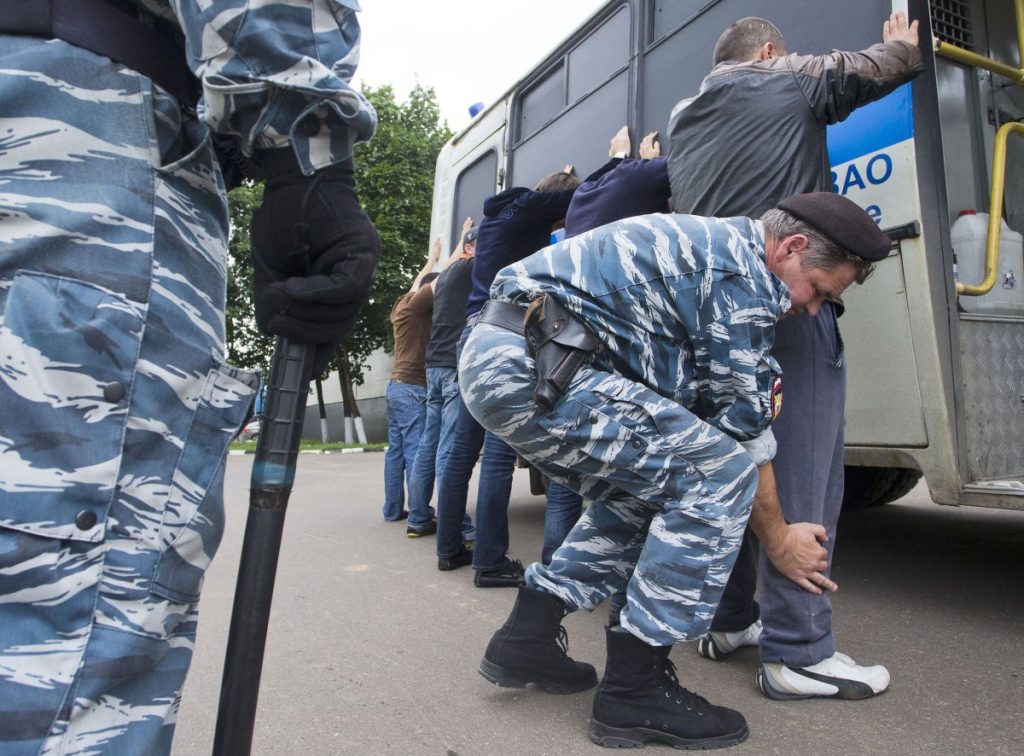Vladimir Putin gave illegal migrants for 4 months to unload legal prestige when he issues a decree that may force the country a lot in 2025.
The Russian President signed a decree on December 30 that provides a deadline of April 30 for those who entered the country illegally to put their documents in order through physical conditioning controls, reimburse their debts and approve a Russian language, a legal history and an exam.
They can also obtain legal status by signing a military contract which could make them available to fight against Ukraine in Putin’s full-scale invasion.
The Russian said in 2021 that there were more than one million illegal immigrants from ancient Soviet countries living in Russia.
According to figures from the OECD of 2019, when the population of Russia exceeded 146 million, about seven % of the population are illegal migrants, which potentially puts much more in threat of expulsion within the framework of the Poutine order.
Newsweek contacted Kremlin by email for comments.
The war in Ukraine has exacerbated an estimated labor shortage in Russia of 1.5 million people, due to high casualties, an exodus of skilled workers avoiding the draft and a more restrictive environment.
Illegal migrants, a giant proportion of payments-central-centro-centro-papys-central, are a key detail in the Russian economy, which is executed with low industries. If they are forced to leave the country or register in the army, Putin’s decree can rise to the turbulence facing Russian sanctions with the economy.
Putin’s decree, signed on Monday, enters into force on New Year’s Day and declares that migrants who are illegally in the country will have to leave the country or resolve their legal prestige before April 30.
Those who wish will have to gather their biometric knowledge and adopt a medical examination that includes drug use tests and the presence of diseases such as HIV.
Exemptions granted to those who sign for the army’s concessions do not apply to migrants “who constitute a risk to the national security” of Russia, the Tass Press Agency reported. Russia’s Ministry of Internal Affairs will put the decree into effect, while the Ministry of Health will arrange medical examinations.
The Russian government repressed migration after a terrorist attack in the concert corridor of the Crocus City Council in the Moscow region, which killed 145 people and injured around 500. An investigation concluded that the authors were Tayikistan.
During the International Economic Forum in St. Petersburg in June, Putin said that his government deserves to read about the migration policy, specifically given the need for migrants to the shortage of hard work that hinders economic growth.
But in its assessment of Putin’s new decree, the Institute for the Study of War (ISW) said on Monday that as the New Year begins, the Kremlin appears to be “prioritizing demands to build Russia’s strength and internal political stability over efforts to ease economic strain and a shortage of hard work. “
Putin’s decree stated that illegal migrants “must independently leave the Russian Federation between January 1 and April 20 or settle their legal status.”
The Institute for the Study of War (ISW) said: “Putin’s decree will probably exacerb Russia or enroll for the Russian army seeks strength.
The ISW said that it is not transparent if the decree will be implemented and depends a lot on whether the demanding situations of the hard work market are greater for the Kremlin than the political tension to free migrants.
The organization of reflected images of Washington, DC, said that the application of the decree would show that the Kremlin grants priority to the ultra-internationalists and security problems in favor of war similar to the reports of migrants who commit crimes and terrorist acts that resolve economic problems.
No, the decree implies that Moscow is “more involved with the use of migrant paintings to triumph over Russia’s economic upheavals and dearth of hard work than messages to the ultra-secularist Kremlin district,” ISW added.
Brendan Cole is a Newsweek Senior News Reporter based in London, UK. His focus is Russia and Ukraine, in particular the war started by Moscow. He also covers other areas of geopolitics including China. Brendan joined Newsweek in 2018 from the International Business Times and well as English, knows Russian and French. You can get in touch with Brendan by emailing [email protected] or follow on him on his X account @brendanmarkcole.

